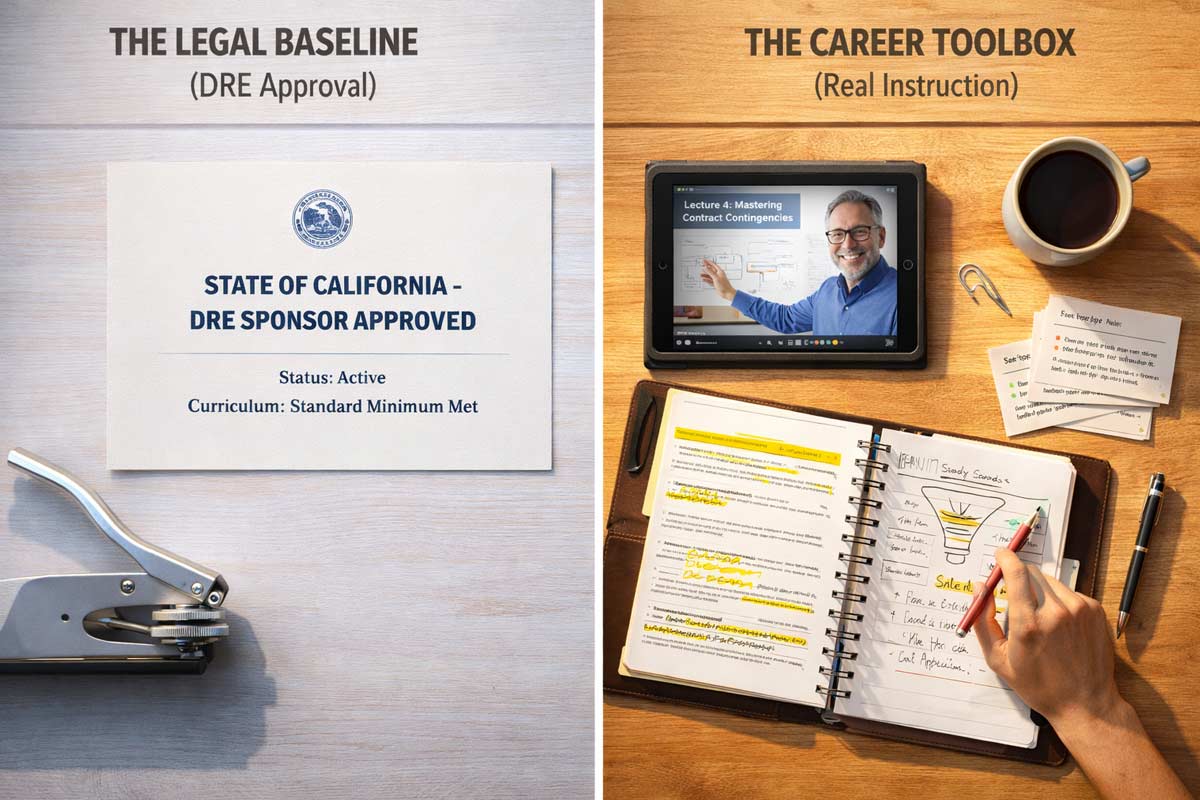Choosing the right real estate school is a big step if you want to succeed in our industry. It's like picking the best map for a road trip—you need clear and reliable directions to reach your destination. Read more...
Choosing the right real estate school is a big step if you want to succeed in our industry. It's like picking the best map for a road trip—you need clear and reliable directions to reach your destination. The real estate school you choose should guide you, providing the essential knowledge and skill
|

Live Scan is an electronic fingerprinting process in California that captures fingerprints digitally and sends them directly to specific agencies, such as the California Department of Justice (DOJ) and Read more...
Live Scan is an electronic fingerprinting process in California that captures fingerprints digitally and sends them directly to specific agencies, such as the California Department of Justice (DOJ) and the Federal Bureau of Investigation (FBI), for a background check. This process is commonly used for employment, licensing, and certification purposes.
Here's how it typically works:
Fingerprinting Appointment: You must schedule an appointment with a Live Scan service provider. During the appointment, your fingerprints are taken electronically, without the need for the traditional ink and paper method.
Filling Out the Form: Before taking your fingerprints, you'll fill out a Live Scan form that includes your personal information and the type of background check required. This form will also specify the agencies that will receive your background check results.
Taking Fingerprints: The technician uses a scanner to capture images of your fingerprints. This process is quick and usually takes about 10 to 15 minutes.
Submission for Background Check: The fingerprints and your details from the Live Scan form are electronically transmitted to the appropriate agencies.
Processing: The DOJ and possibly the FBI process your fingerprints to check for criminal records or other relevant information.
Results: The background check results are sent directly to the employer or agency that requested them. The turnaround time can vary, but it typically takes a few days to a few weeks.
Privacy and Security: The data transmitted during the Live Scan process is encrypted to ensure privacy and security.
Live Scan is preferred over traditional methods because it's faster, and the digital method reduces the chance of errors commonly associated with ink fingerprinting.
An applicant for any real estate license is required to provide one set of fingerprints that are classifiable and accepted by the State Department of Justice (DOJ). Fingerprints can be taken either after applying for the examination or once the examination has been passed. If an applicant fails the examination, fingerprint processing fees will not be refunded. Social security numbers must be included on examination applications to ensure that the fingerprint reports are accurately matched and sent to the Department of Real Estate (DRE).
Fingerprints must be submitted through the DOJ's Live Scan Program, which captures and sends fingerprints to both the DOJ and the Federal Bureau of Investigation (FBI) using the Live Scan Service Request (RE 237) form, which is a PDF document. An original license will only be issued once the DRE has received and reviewed reports from both the DOJ and the FBI.
To have your fingerprints taken, bring the Live Scan Service Request (RE 237) form to a Live Scan service provider participating in the program. There is a fingerprint processing fee of $49, plus an additional fee charged by the Live Scan provider, both of which are payable directly at the service provider (not to the DRE). After having your fingerprints taken, submit a copy of the Live Scan Service Request (RE 237) form with Part 3 completed to the DRE.
For those not residing in California, you can get fingerprinted at a Live Scan service provider within California by following the instructions mentioned above, or outside of California using two FBI Applicant Fingerprint Cards (FD-258). If using fingerprint cards, take them to a local law enforcement agency to be filled out and send them directly to the DRE along with the completed license application, the license application fee, and the $49 fingerprint processing fee (a combined payment for exam/license and fingerprint fees is acceptable).
ADHI Schools is here to help you apply for the exam and we can even roll your fingerprints for you if you are local to Rancho Cucamonga. While the Livescan won’t give us a copy of your background check, be sure to disclose anything requested on the application in terms of background items. The DRE may not issue you a license if they deem that your background would warrant denial of a license.
Love,
Kartik
|

Choosing to start a career in real estate is exciting and full of opportunities. But before jumping in, it makes sense to find out what real estate school is about. Doing your homework helps you know what Read more...
Choosing to start a career in real estate is exciting and full of opportunities. But before jumping in, it makes sense to find out what real estate school is about. Doing your homework helps you know what to expect, making it easier to handle the challenges and succeed.
Real estate school should teach you more than just how to pass an exam; it gives you the skills and knowledge you need for your future job. It's essential to check that the school's courses match what you want from your career and that you're ready for the time and work it requires.
Knowing about our school's setup and what the classes are like helps you prepare better. It also shows you what it means to work in real estate, not just how to get your license.
In short, learning about real estate school before you enroll is a smart move. It helps you go in prepared and confident, ready to take on the challenges and grab the opportunities that come with a career in real estate.
Curriculum Deep Dive: Core Components of Your Real Estate Education
To become a licensed real estate agent in California, three specific courses are required: Real Estate Principles, Real Estate Practice, and one elective. Each course is designed to equip aspiring real estate professionals with the knowledge they need to succeed in the industry. Let's explore what each course covers, their importance, and why ADHI Schools recommends "Legal Aspects of Real Estate" as the elective course.
Real Estate Principles
The Real Estate Principles course lays the foundational knowledge every agent needs. It covers a broad spectrum of topics, including property ownership and land use controls, real estate law, and the nuances of property valuation. Understanding these principles is crucial as it provides the groundwork for making informed decisions in buying, selling, leasing, and managing real property. This course is essential because it teaches the theoretical aspects of real estate that are critical for passing the state licensing exam and effectively serving future clients.
Real Estate Practice
Real Estate Practice focuses on the day-to-day operations in real estate, such as listing, selling, leasing, buying, and managing property. This course provides practical knowledge on conducting real estate transactions, including marketing properties, understanding buyer and seller needs, and completing some contract forms. It also teaches critical skills in negotiation and closing transactions. This vital course bridges the gap between theoretical knowledge and practical application, preparing students for real-world real estate activities.
Elective Course: Legal Aspects of Real Estate
ADHI Schools strongly recommends "Legal Aspects of Real Estate " for the elective. This course dives deeper into the legal intricacies of real estate transactions and property law. It covers topics such as contracts, property rights, the legal implications of real estate finance, and recent changes in real estate law and tax regulations. Understanding these aspects is vital for anyone in the field, as it helps protect agents and their clients from legal pitfalls.
By completing these courses, students are well-prepared to take the California real estate licensing exam and embark on a successful career.
Learning Formats & Study Tips: ADHI's Modern Approach to Real Estate Education
At ADHI Schools, we recognize that real estate education needs to be flexible, accessible, and efficient. That's why we've tailored our course offerings to meet the demands of today's learners and industry standards, emphasizing the advantages of remote learning while addressing the limitations of traditional classroom settings.
Self-Study and Instructor-Led Courses
We offer two primary learning formats: self-study and instructor-led courses. Our self-study options provide the utmost flexibility, allowing students to progress at their own pace and schedule. This is ideal for those who need to balance other commitments, such as work or family, but still want comprehensive access to quality educational content.
Our instructor-led courses are delivered via Zoom for those who thrive under guided instruction. This format combines the convenience of online study with the benefits of live interaction. Students can engage directly with experienced instructors and peers in real time, enjoying a dynamic learning environment without commuting. This saves time, reduces travel costs, and lessens the environmental impact of traditional classroom settings.
The Outdated Model of In-Person Classes
Traditional in-person coursework must be updated for today's fast-paced, digital world. The future of real estate education lies in digital accessibility and interactive learning environments. In-person classes often need more flexibility than many aspiring real estate professionals. They can be a barrier to those who cannot commit to rigid schedules or travel to distant locations.
The Best of Both Worlds
Our Zoom-led instructor courses offer the best of both worlds: the ease of online access with the personalized touch of in-person training. This hybrid model ensures that all students, regardless of location or schedule, can benefit from high-quality real estate education and interactive sessions that foster a more profound understanding and retention of course material.
By choosing ADHI Schools, you're not just enrolling in a real estate school—you're embracing a modern, innovative approach to learning that prepares you for success in the real estate market. Our formats are designed to equip you with the knowledge and skills necessary to excel, utilizing traditional educational principles and cutting-edge technology.
Embarking on a new educational journey in real estate shouldn’t have to mean putting your life on hold. You don't need to be a full-time student to achieve your dreams of becoming a licensed real estate professional.
Prepping for the Real Estate Exam with CrashCourseOnline.com
Once you finish the pre-license courses, the next step is to prepare for the real estate exam. This is where you consolidate all your learning and prepare to succeed. A robust tool in your arsenal should be CrashCourseOnline.com, specifically designed to optimize your exam preparation.
CrashCourseOnline.com offers a comprehensive suite of resources tailored to the real estate license exam's structure and content. Familiarizing yourself with the exam format is essential, and our platform covers multiple-choice questions, simulations, and potential essay components. What sets CrashCourseOnline.com apart is its focus on interactivity and real-world simulation, providing practice exams that mimic the testing environment.
Our iPhone and Android apps make studying flexible and accessible, allowing you to prepare on the go and fit study sessions into your busy schedule. The apps are designed to enhance learning efficiency with features like timed quizzes, answer explanations, and progress tracking.
These tools help you master test-taking strategies such as question analysis, time management, and critical thinking under exam conditions.
Encouragement Every Step of the Way
We believe in encouraging our students through every step of their real estate education. At ADHI Schools, you're not just another student but part of a community that cares about your success. Our instructors are dedicated professionals who are as invested in your achievements as you are. They are readily available to help you navigate your courses and confidently prepare for the real estate exam.
Becoming a real estate agent is a personal and professional growth journey. With ADHI Schools, you have a partner in education who provides the tools and support you need to excel without overwhelming your daily life. Enroll with us, and take the first step towards a successful career in real estate with the flexibility and encouragement you deserve.
Love,
Kartik
|

Selecting a real estate school is the first professional decision you will make in your new career. It is often the difference between getting licensed in six months or being stuck in a cycle of retakes Read more...
Selecting a real estate school is the first professional decision you will make in your new career. It is often the difference between getting licensed in six months or being stuck in a cycle of retakes and frustration two years from now.
Many prospective agents choose a school based solely on the lowest price or the flashiest marketing promise. However, a "cheap" course becomes expensive very quickly if the materials are outdated, the support is non-existent, or the curriculum fails to prepare you for the California Department of Real Estate (DRE) state exam.
Most students who come to us after failing elsewhere don’t lack effort—they lacked access to real instruction. After 20 years of helping students navigate this process, I’ve learned that the "best" school isn't a universal title—it’s the one that prioritizes actual learning over marketing optics.
Quick Take: The 30-Second Summary
Verify Legal Standing: Confirm a valid DRE Sponsor ID before looking at anything else.
Prioritize Support: Access to a human instructor is the primary factor in passing the first time.
Evaluate Exam Prep: Look for depth and rationales, not just a bank of "A, B, C, D" questions.
Scrutinize Policies: Treat "guarantees" as fine-print audits rather than quality indicators.
Step 1: Confirm the Legal Baseline (DRE Approval)
In California, you cannot sit for the state exam unless you complete three college-level courses from an approved provider. DRE approval is the absolute minimum legal requirement—it is not a rating of quality. It simply means the school has permission to offer the curriculum.
How to verify in minutes:
Ask the school for their DRE Sponsor ID.
Visit the DRE website to confirm their status is "Approved."
Check if they offer the three mandatory courses: Real Estate Principles, Real Estate Practice, and an elective.
To understand why this approval is just the starting line, read our guide on What Makes a Real Estate School DRE-Approved?
Step 2: Decide What Kind of Student You Are
The format of the school should match your lifestyle, not the other way around. A "self-paced" course is only a value if you have the discipline to finish it without a structured environment.
Learner Profile
Priority
Recommended Feature
The Full-Time Professional
Efficiency
High-quality mobile interface & clear PDF materials.
The Anxious Test-Taker
Stability
Live webinars or in-person coaching components.
The Fast-Tracker
Support
Responsive administrative teams for finishing certificates.
The Career Switcher
Practicality
Instructors who provide context through California examples.
Real-World Scenario: Many students choose a purely digital format because it's cheaper, only to realize months later they’ve stopped making progress because they have no one to ask for clarification.
Step 3: Instructor Access is the Hidden Difference-Maker
Many online schools are essentially "digital bookstores." They sell you the material and leave you to navigate it alone.
If you hit a wall while studying Agency or Valuation, you need a human answer. In high-volume, low-support environments, you might wait days for a canned email response. This delay kills your momentum.
When evaluating a school, ask: “If I don’t understand a concept, can I reach out to an instructor, or am I limited to a help-desk ticket?”
Instructional depth is what prevents failure. You can learn more about this in our guide on The Role of Instructors in CA Real Estate Education.
Step 4: Evaluate Prep Quality (Beyond the "Guarantee")
The goal is to pass the state exam on your first attempt. High-quality exam prep is about feedback loops, not just repetition.
The Baseline: A school that only gives you a score at the end of a quiz.
The Standard: A program that provides a detailed rationale for every answer (explaining why the correct answer is right and the others are wrong).
Scrutinizing the Guarantee:
Many schools market a Pass Guarantee. It is important to view these as administrative policies rather than trust signals. A guarantee is effectively a "post-failure" plan; it does not indicate the quality of the instruction itself. Often, the fine print requires multiple failures or specific prerequisites to qualify. Focus on the quality of the practice rationales—that is what keeps you from needing the guarantee in the first place.
Step 5: Know When a Crash Course Helps (and When It’s a Trap)
A crash course is a "gap-closer," not a foundation. If the primary pre-licensing courses were low-quality, a weekend session cannot replace 135 hours of lost learning.
The Readiness Benchmark: If you are scoring 70–75% on practice exams, a crash course can provide the "test-taking logic" to secure a pass. If you are scoring 50%, you likely need to revisit the core material.
For more on timing your prep, see: Are Crash Courses Worth It in California?
Step 6: Compare Total Cost & Friction
The "sticker price" of a real estate school is rarely the final cost. Look for "friction points" that lead to hidden expenses:
Extension Fees: Charges if you don't finish the course within a strict window.
Retake Fees: Fees for re-taking a course final exam.
Tech Friction: Outdated portals that don't work well on mobile or modern browsers.
Insider Tip: If a school’s support is slow during the enrollment process, it will likely be slower when you are waiting for your course completion certificates.
Step 7: The Simple Decision Checklist
Use this rubric to evaluate providers. Score them based on substance, not marketing.
DRE Approved: Verified Sponsor ID (Non-negotiable).
Direct Instructor Access: Can I get a human on the phone or email?
Feedback Loops: Does the exam prep explain the "why" behind the answers?
Policy Clarity: Are refund and retake policies written in plain English?
Format Fit: Does this match my actual daily schedule?
Frequently Asked Questions
Do I really need an exam pass guarantee?
Guarantees are secondary to instructional quality. A guarantee is relevant only after you have failed. Your priority should be finding a school with active instructor support and robust practice rationales—the tools that help you pass the first time.
Does DRE approval mean the school is "good"?
No. DRE approval only means the school meets the minimum legal curriculum requirements. It is a baseline for entry, not a measure of how well the school prepares you for a career or the state exam.
What should I prioritize if I work full-time?
Prioritize "support responsiveness." When your study time is limited to late nights or weekends, you cannot afford to wait days for a response to a question. You need a school that provides the resources to keep you moving forward.
Take the Next Step
Choosing a real estate school is about finding a partner for your licensure journey. A great school makes guarantees mostly irrelevant because the instruction is designed to help you pass the first time. To see how different programs compare across the state using this objective framework, view our guide to the best real estate schools in California.
|

The real estate industry is built on trust. Clients rely on agents to guide them through complex transactions, often involving significant financial and emotional investment. Maintaining this trust requires Read more...
The real estate industry is built on trust. Clients rely on agents to guide them through complex transactions, often involving significant financial and emotional investment. Maintaining this trust requires a solid commitment to ethical conduct, especially when managing conflicts of interest.
Definition of Conflict of Interest
A conflict of interest arises when an agent's interests or duties to another client interfere with their ability to act in the best interests of their current client. This can involve financial gain, personal relationships, or any situation where the agent's objectivity is compromised.
Imagine you're a real estate agent with two clients interested in the same house. One of the clients is a close family friend. Even though you might naturally want to help your friend more, as a real estate agent, you must treat both clients fairly and equally. This situation could lead to a conflict of interest because your relationship with your friend might influence your professional judgment. You can give your friend inside tips or encourage the seller to accept their offer over the other client's, even if it's not the highest offer. In real estate, agents must always act in the best interest of their clients and maintain professional integrity by avoiding any actions that could benefit them personally or favor one client unfairly over another.
Importance of Addressing Conflicts
Failing to address conflicts of interest can damage client relationships, lead to legal disputes, and tarnish an agent's reputation. Proactively managing these situations is crucial for maintaining professionalism and upholding the integrity of the real estate industry.
Common Scenarios Leading to Conflicts of Interest
Dual Agency: Representing the buyer and seller in a transaction presents a significant conflict. While allowed in some states with informed consent, it can be challenging to ensure both parties receive unbiased advice and negotiation.
Family or Personal Relationships: Transactions involving family members or close friends can create conflicts, even if the agent believes they can remain impartial. Perceived favoritism can undermine trust.
Financial Interests: An agent with a financial stake in a property or related business—like a real estate broker who also owns a mortgage company—can create a conflict if it influences their recommendations to clients.
Ethical Ways to Handle Conflicts of Interest
Full Disclosure: Openly disclose any potential or perceived conflict to all parties involved. This includes the nature of the conflict and how it might affect the transaction.
Obtaining Informed Consent: After full disclosure, obtain written consent from all parties acknowledging the conflict and agreeing to proceed with the agent's representation.
Refusing or Handing Off Representation: In some cases, the best approach is to decline or withdraw from the transaction to avoid compromising ethical obligations. This might involve referring the client to another agent.
Real Estate Board Policies: Navigating Conflicts of Interest
Local and national real estate boards, such as the National Association of REALTORS® (NAR), play a vital role in maintaining ethical standards within the industry. These organizations often establish detailed codes of ethics that serve as a framework for handling potential conflicts of interest and ensuring professional integrity.
For instance, the NAR's Code of Ethics and Standards of Practice outlines clear expectations for REALTORS® to act honestly, transparently, and in the best interests of their clients. Article 1 emphasizes the obligation to protect and promote clients' interests, while Article 2 requires the disclosure of all pertinent facts about a property that may affect its value or desirability. These principles guide agents in avoiding situations where personal or financial interests might conflict with their duty to the client.
Local real estate boards also adopt similar ethical standards tailored to their specific regions. These policies help agents navigate conflicts of interest, such as representing both a buyer and seller in the same transaction (dual agency) or having a financial stake in a property being sold. Boards often require agents to disclose such relationships fully and ensure the client's informed consent.
By adhering to these ethical guidelines, real estate professionals can maintain the trust of their clients and the public while fostering a culture of accountability and fairness within the industry.
The Bad Foundation Example
Imagine an agent representing a buyer discovers that the property they are interested in has significant, undisclosed foundation issues. The seller, eager to close the deal, pressures the agent to minimize the severity of the problem or avoid mentioning it altogether. However, the agent knows their fiduciary duty is to act in their client's best interest, the buyer.
Rather than succumbing to the seller's demands, the agent immediately informs the buyer about the potential foundation issues. They recommend that the buyer hire a licensed professional to conduct a thorough inspection before purchasing. By doing so, the agent ensures the buyer has all the necessary information to make an informed decision, demonstrating integrity and professionalism.
This example highlights the importance of upholding fiduciary duties, even in challenging situations. It underscores the agent's responsibility to prioritize their client's interests over external pressures, ultimately protecting them from potential financial or legal risks.
Best Practices for Real Estate Professionals
Training and Education: Continue education on ethical practices and conflict management to stay informed about best practices and legal requirements.
Consulting Legal Professionals: Consult a real estate attorney or experienced mentor for guidance when facing a complex conflict.
Maintaining Transparency: Prioritize transparency in all client interactions. Proactive communication and clear documentation can help prevent misunderstandings and mitigate potential conflicts.
Navigating conflicts of interest is an essential skill for real estate professionals. Agents can build trust, protect their reputation, adhere to ethical principles, prioritize client interests, maintain transparency, and contribute to a more moral and professional real estate industry.
Conflicts of interest are an inevitable challenge in the real estate industry, but how professionals handle these situations defines their integrity and success. Agents can confidently navigate these complexities by understanding the nature of conflicts, adhering to ethical standards, and leveraging tools like full disclosure and informed consent.
Addressing conflicts of interest is not merely about complying with rules—it's about building and preserving trust, the cornerstone of every client relationship. When agents prioritize their fiduciary duty, maintain transparency, and stay committed to ethical practices, they not only protect their clients but also enhance the professionalism and reputation of the industry.
Managing conflicts ethically is a hallmark of a successful real estate professional. Agents can foster stronger relationships and contribute to a real estate landscape defined by accountability, fairness, and trust by continuing to learn, consult, and apply best practices.
Love,
Kartik
|

The real estate industry is built on trust. Buying or selling a property is often the most significant financial decision in a person's life, and clients depend on their agents for expert guidance and Read more...
The real estate industry is built on trust. Buying or selling a property is often the most significant financial decision in a person's life, and clients depend on their agents for expert guidance and support. This reliance makes ethical conduct vital for every real estate professional. Ethical agents don't just follow the rules; they prioritize honesty, transparency, and their client's best interests in every interaction. This commitment to integrity builds strong client relationships and forms the bedrock of a successful and fulfilling career.
Understanding Your Role as a Fiduciary
Real estate agents hold a unique position of trust. They act as fiduciaries for their clients, meaning they have a legal and ethical obligation always to put their clients' needs first. This fiduciary duty encompasses several vital principles: loyalty, always prioritizing the client's interests; confidentiality, safeguarding sensitive information; disclosure, providing all relevant information, even if it's not favorable; obedience, following lawful client instructions; reasonable care and diligence, providing competent and skilled service; and accounting, handling funds and property responsibly.
Transparency: The Key to Building Trust
Open and honest communication is essential for building strong client relationships. Be upfront about potential challenges, market conditions, and any factors influencing their decisions.
Transparency goes beyond simply answering questions; it means proactively sharing information and setting realistic expectations. Communicate timelines, potential obstacles, and the intricacies of the real estate process. Keep your clients informed and engaged through regular updates and feedback, ensuring they feel heard and understood throughout their journey.
Example: The Power of Transparency in Real Estate
A seasoned real estate agent, Emma met with Alex and Mia, a young couple eager to purchase their first home. They were captivated by a charming, older house with a history of foundation issues. Understanding the importance of honesty, Emma openly shared her findings with the couple, explaining the potential for future complications and the competitive market conditions.
Determined to ensure their first investment was sound, Emma discussed the benefits and drawbacks of older versus newer homes, highlighting possible challenges and setting realistic expectations for the buying process. She maintained frequent communication, providing updates and addressing their concerns, which made them feel supported and valued.
Appreciating her candidness, Alex and Mia explored other listings and eventually purchased a newer home that offered stability without unforeseen costs. Grateful for Emma's guidance, they later expressed their happiness and confidence in their decision, thanking her for her transparency.
Emma's commitment to transparent, honest communication helped them find the right home and solidified a trusting client relationship, showcasing the critical role of transparency in real estate transactions.
Navigating Ethical Dilemmas
Even with the best intentions, real estate professionals often encounter ethical dilemmas. These situations require careful consideration and a commitment to upholding your fiduciary duties.
Dual Agency: Representing the buyer and seller in the same transaction presents unique challenges. Disclose this relationship clearly and obtain informed consent from both parties. Strive to maintain neutrality and ensure that both clients receive fair and equal representation.
Misrepresentation and Fraud Avoid any temptation to exaggerate or misrepresent facts. Providing false or misleading information can have severe legal and ethical consequences. Always prioritize honesty and accuracy in your dealings.
Confidentiality: Protecting client privacy is paramount. Handle sensitive information with discretion and use it only for the intended purpose. Avoid discussing client matters with unauthorized individuals.
Multiple Offers: When managing multiple offers, present all offers pretty and transparently to the seller. Avoid any actions that could give one buyer an unfair advantage and guide your client to make informed decisions based on their best interests.
The Importance of Ongoing Learning
Real estate is a dynamic field with ever-changing laws and regulations. Commit to continuing education to stay informed about the latest legal requirements, market trends, and best practices. This ongoing learning demonstrates your dedication to professionalism and enhances your ability to serve your clients effectively.
Ethics as a Competitive Advantage
Ethics can be a powerful differentiator in today's competitive real estate market. Clients are increasingly seeking agents they can trust, professionals who prioritize integrity over quick deals. By showcasing your commitment to ethical conduct, you attract clients who value these principles and build a loyal client base that fuels long-term success.
Building a Legacy of Integrity
Ethical conduct is not just a set of rules to follow; it's a way of doing business that reflects your values and commitment to your clients. By consistently acting with integrity, you build a reputation that attracts clients, earns referrals, and fosters lasting relationships. Embrace ethical practices in every aspect of your real estate business, and you'll achieve professional success and contribute to a more trustworthy and respected real estate industry.
Love,
Kartik
|

What are the 5 Things Real Estate Agents Struggle With the Most?
Have you ever dreamed of a career that not only pays well but also gives you the freedom to manage your own schedule and make a Read more...
What are the 5 Things Real Estate Agents Struggle With the Most?
Have you ever dreamed of a career that not only pays well but also gives you the freedom to manage your own schedule and make a real impact on people's lives? Becoming a real estate agent might be the perfect fit. This career path offers incredible flexibility, potential for high earnings, and the unique satisfaction of helping clients navigate one of the most significant decisions they will ever make: buying or selling a home.
Yet, like any promising career, it comes with its set of challenges. From generating leads to managing complex transactions, the world of real estate demands resilience, strategic thinking, and continuous learning. Whether you're considering a shift from your current job or you're a seasoned professional looking to enhance your skills, understanding these challenges is the first step toward a thriving career in real estate.
Generating Quality Leads Every real estate agent needs a steady flow of good leads. Without people interested in buying or selling homes, there are no deals to make. Finding these leads can be tough, especially with methods like cold calling or door knocking that don't always work well.
How to Overcome It:
Strong Online Presence: Keep a professional website, highlight your listings, and post interesting content on social media.
Targeted Advertising: Use online ads on platforms like Google or Facebook to reach specific groups of people in your market.
Build Relationships:Attend local events, work with businesses that complement yours, and be known as a local expert.
Fierce Competition The real estate market is full of agents, so standing out is essential. New agents may find it hard to compete with experienced ones, and even seasoned agents face competition from online services and discount brokers.
How to Overcome It:
Define Your Niche: Focus on a specific type of property or area to become the expert people go to.
Offer Exceptional Value: Provide extra services like staging tips or detailed market analysis.
Showcase Your Success: Use testimonials from happy clients in your marketing.
Fluctuating Market Conditions The real estate market changes often because of different interest rates, economic shifts, and local trends. Agents need to adjust their strategies to keep up.
How to Overcome It:
Stay Informed: Follow real estate news closely and attend industry events.
Adjust Your Approach: Be ready to switch your strategies depending on whether it’s a buyer's or seller's market.
Focus on Long-Term Relationships: Keep in touch with past clients and help them whenever you can, even when the market is slow.
Time Management and Work-Life Balance Real estate agents usually work long and odd hours, which can make balancing work and personal life difficult. Being available for clients is important, but so is taking care of yourself.
How to Overcome It:
Set Boundaries: Decide on your work hours and stick to them. Use tools that help automate your tasks.
Outsource/Delegate: If possible, hire an assistant to handle routine tasks.
Prioritize Self-Care: Make time for yourself to relax and enjoy hobbies or time with family.
Dealing with Difficult Clients Buying or selling a home is stressful, and clients can be hard to handle. It’s important for agents to stay professional and patient.
How to Overcome It:
Set Clear Expectations: Talk about the process, timelines, and possible issues at the start.
Active Listening: Pay close attention to what your clients want and need.
Know When to Walk Away: If a client relationship isn’t working, it’s okay to end it to avoid further stress.
Understanding and managing these challenges will help you build a successful career in real estate.
while the journey to becoming a successful real estate agent is filled with challenges, it is also immensely rewarding. By recognizing and addressing the five major hurdles—generating quality leads, navigating fierce competition, adapting to fluctuating market conditions, managing time effectively, and dealing with difficult clients—you set the foundation for a fulfilling career. Remember, each challenge presents an opportunity to grow stronger and become more adept at your craft.
Embrace these challenges with a proactive mindset, and use the strategies discussed to turn potential setbacks into victories. Maintain a strong online presence, define your niche, stay informed about market trends, set personal boundaries, and prioritize communication with your clients. By doing so, you will not only enhance your professional skills but also increase your satisfaction and success in the real estate industry.
Whether you are just starting out or looking to refine your expertise, remember that your journey is unique. Stay committed, continue learning, and never underestimate the impact you have on your clients' lives. With determination and the right approach, you can navigate the complexities of the real estate market and emerge as a top-performing agent. So, take the leap, build your skills, and start shaping your successful real estate career today!
Love,
Kartik
|

Is the Real Estate Market Going to Crash in 2025?
In recent years, the real estate market has been a true rollercoaster, experiencing sky-high prices, wildly fluctuating mortgage rates, and a persistent Read more...
Is the Real Estate Market Going to Crash in 2025?
In recent years, the real estate market has been a true rollercoaster, experiencing sky-high prices, wildly fluctuating mortgage rates, and a persistent imbalance between supply and demand. As the chatter about a potential 2025 real estate market crash intensifies, many are curious if we are approaching the bursting point of what some call a housing market bubble.
I wanted to write an article to dive into the key factors contributing to this uncertainty and offer insights into potential market directions
Understanding Market Dynamics
Homeowners Staying Put: With the historically low interest rates of 2021-2022, many homeowners seized the opportunity to lock in low rates. Despite the recent decline in interest rates, many homeowners are still reluctant to sell, fearing they won't secure similarly favorable rates today. This reluctance has led to a reduced number of homes on the market, exacerbating the current supply shortage.
Fewer New Listings and Increased Buyer Competition: Many potential sellers are holding off on entering the market, cautious of higher mortgage costs despite lower interest rates. Meanwhile, the affordability brought on by the lower rates has widened the buyer pool, intensifying competition and driving prices up. This situation presents challenges particularly for first-time buyers and those with limited budgets, adding pressure to an already heated market.
A Market on Shaky Ground
As we saw through 2024, home prices reached unprecedented heights, while the 2023 spike in mortgage rates stretched affordability thin for many. Although there has been a slight easing in mortgage rates, the fundamental mismatch between supply and demand persists, further fueling price growth and competition. This dynamic raises concerns about whether the market is on the verge of a significant correction or if it will stabilize under current conditions.
Expert Opinions: A Range of Predictions
The opinions among economists and real estate analysts about what will happen in the housing market are quite different. Some experts think a big downturn could happen soon because the market has been too hot, with house prices going way up too fast. They believe that things might cool down sharply because homes are becoming too expensive for many people to buy.
However, another group of experts thinks the market will cool down slowly, not suddenly crash. They say that even though houses are expensive, many people still want to buy homes, and there aren't enough homes available, which could keep the market stable. These experts think any changes will happen gradually.
With all these different opinions and factors, people who are interested in buying or selling homes, or those who work in real estate and are getting their real estate license, need to stay alert and keep learning about the market.
The Looming Question: Crash or Correction?
Predicting the exact trajectory of the real estate market is complex, with 2025 poised as a critical year for determining whether the market will crash, correct, or continue its upward trend. For those looking to navigate this uncertain landscape—whether buyers, sellers, or real estate license school students —the key is preparation and informed decision-making.
Preparing for Market Fluctuations
In this unpredictable environment, readiness is crucial. Buyers should consider current market conditions against their personal financial situations. Sellers need to set realistic pricing to avoid prolonged market listings. Investors are advised to perform thorough market analyses to understand potential risks and opportunities.
Navigating the complexities of the real estate market requires up-to-date knowledge and strategic thinking—skills taught at leading real estate schools. By staying informed and applying practical, evidence-based strategies, buyers and sellers can protect their interests and capitalize on opportunities in the real estate market, no matter the economic climate.
Love,
Kartik
|

Choosing the right real estate license school is a major step for anyone looking to succeed in California’s real estate market. A good real estate school will do more than teach you facts; they lay the Read more...
Choosing the right real estate license school is a major step for anyone looking to succeed in California’s real estate market. A good real estate school will do more than teach you facts; they lay the groundwork for your career. In California, to become a licensed real estate agent, you must pass a state exam that tests your knowledge and readiness to work professionally.
Your school should teach you about real estate laws, how to help clients buy and sell properties, and how to act ethically in your job. The education you get not only helps you pass your exam but also prepares you to face the challenges and grab the opportunities in the real estate world. So, picking the right school is crucial because it shapes your future as a professional agent.
The Importance of Accreditation
Accreditation is another crucial factor to consider when selecting a real estate license school. Accredited schools like ADHI Schools have been reviewed and validated for quality and efficacy by the Department of Real Estate. This isn’t just about meeting minimum standards; accreditation is a seal of quality that ensures the education you receive will be respected and recognized. It also signals to employers and clients that you have been trained under rigorous educational standards, boosting your credibility and professional standing in the competitive real estate industry.
Benefits of Online and Online “Live” Real Estate Courses
Online real estate courses offer several advantages, particularly in terms of flexibility, accessibility, and self-paced learning. These courses are ideal for those who have busy schedules or who live far from traditional classroom locations. They allow students to access materials at any time and from anywhere, making it easier to fit learning into a hectic lifestyle. Standout features of our online courses often include:
Video Tutorials: Engaging video lessons that can be paused and replayed, helping you to understand complex topics at your own speed.
Interactive Modules: Interactive learning experiences that keep you engaged and test your knowledge as you progress.
Mobile-Friendly Platforms: The ability to study on the go with courses optimized for smartphones and tablets, ensuring you can learn even when you’re away from your computer.
Hybrid Learning Options
Hybrid courses combine the best aspects of online and classroom learning. These programs typically involve a mix of online coursework to cover theoretical knowledge and scheduled in-person sessions for more practical, hands-on training. This format can be particularly beneficial as it offers:
Flexibility and Interaction: You can enjoy the flexibility of online learning while still benefiting from the interpersonal and experiential advantages of traditional classroom attendance.
Balanced Structure: The structure of hybrid models provides a balanced approach, catering to different learning preferences and needs.
The Value of Experienced Instructors
The experience and teaching styles of instructors at a real estate license school play a critical role in shaping the quality of education. Experienced instructors bring a wealth of real-world knowledge to their teaching, offering insights that go beyond textbooks and theoretical concepts. They are often well-versed in the latest industry trends and regulatory changes, which can provide students with a more comprehensive understanding of the real estate landscape.
Teaching style also significantly impacts learning outcomes. Instructors who employ interactive and adaptive teaching methods can cater to various learning styles, ensuring that all students grasp complex topics. This versatility is crucial for effectively preparing students for the varied scenarios they will encounter on the real estate exam and in their future careers.
The presence of knowledgeable instructors is particularly important for real estate exam success. These professionals can pinpoint the most important content that is likely to appear on the exam and provide students with strategies to tackle difficult questions. Moreover, their ability to clarify doubts and provide real-time feedback is invaluable in building confidence and competence among students.
CrashCourseOnline.com
CrashCourseOnline.com offers a unique advantage in real estate exam preparation with its comprehensive suite of study tools designed specifically for California real estate licensure. What sets CrashCourseOnline.com apart includes:
Tailored Content: All resources are specifically designed to meet the requirements of the California real estate exam, ensuring that students study the most relevant and up-to-date information.
Interactive Learning Tools: The platform includes interactive features like practice quizzes and real-time feedback, which help reinforce learning and build confidence as students see their progress.
Accessibility and Flexibility: With courses and materials available online, students can prepare on their schedule and at their pace, which is crucial for adult learners who may be balancing other responsibilities.
Expert Guidance: CrashCourseOnline.com provides access to seasoned real estate educators who offer live exam prep sessions. These sessions delve into exam strategies, breakdown challenging areas, and answer student questions in real time, providing a level of personalized preparation that can be hard to find elsewhere.
By using these preparation materials and engaging with platforms like CrashCourseOnline.com, students can greatly enhance their chances of success on the California real estate exam. The comprehensive resources and expert guidance available can give them a competitive edge in a challenging field.
Choosing the right real estate license school is a pivotal decision that can impact your career for years to come. As you make this decision, consider the following key factors:
Accreditation and DRE Approval: Ensure that the school is approved by the California Department of Real Estate and accredited by relevant authorities.
Learning Formats: Reflect on whether online, classroom-based, or hybrid learning environments suit your learning style and schedule best.
Experienced Instructors: Look for schools with knowledgeable and experienced instructors who can provide not only the curriculum but also valuable industry insights.
Support Resources: Evaluate the availability of student support services such as tutoring, forums, and dedicated staff to help you through your studies.
Exam Preparation: Consider the quality and effectiveness of the exam preparation materials offered, such as mock exams, study guides, and live prep courses.
It’s essential to do thorough research and choose a school that aligns with your career goals and educational needs. Take the time to read reviews, talk to alumni, and perhaps attend a few introductory sessions or webinars to get a feel for the school’s environment and offerings.
Ready to take the first step towards a successful career in real estate? Enroll today at ADHI Schools or start your preparation with CrashCourseOnline.com.
Love,
Kartik
|

How Long Does the California Real Estate Exam Take?
If you’re planning to become a real estate agent in California, one of the key steps is passing the California real estate exam. Knowing how long Read more...
How Long Does the California Real Estate Exam Take?
If you’re planning to become a real estate agent in California, one of the key steps is passing the California real estate exam. Knowing how long the exam will take helps in preparing effectively and managing your time on the day of the test. This article will cover everything you need to know about the duration of the exam and how to approach it efficiently.
Total Duration of the Exam
The California real estate exam is designed to test your knowledge in various real estate topics, including property ownership, laws, valuation, financing, and contracts. For the sales license exam, it consists of 150 multiple-choice questions, and you are given up to 3 hours to complete it. This means you have about 1 minute and 11 seconds per question on average. It’s a manageable pace if you're prepared, but rushing or spending too much time on a single question can impact your ability to finish the exam.
For those taking the broker exam, it is longer, consisting of 200 multiple-choice questions with 4 hours allotted to complete the exam.
Breakdown of the Exam:
Sales License Exam:
Number of Questions: 150 multiple-choice questions.
Time Allotted: 3 hours (180 minutes).
Broker Exam:
Number of Questions: 200 multiple-choice questions.
Time Allotted: 4 hours (240 minutes).
Key Considerations
Here are some tips to manage your time during the exam:
Practice Time Management: When practicing for the exam, completing practice tests within the time limit is crucial. This builds comfort with the pacing and prepares you for the actual test day. Our blog on Effective StudyTechniques for the Real Estate Exam offers additional insights and strategies.
Skip and Return to Hard Questions: If you encounter a tough question, it’s often better to move on and come back to it later. This approach ensures you don't waste too much time on any single question and that you cover more ground.
Read Questions Carefully: While keeping an eye on the clock, make sure to read each question thoroughly. Misreading can lead to easy mistakes.
Watch the Clock: Monitoring your time can help adjust your strategy on the fly, ensuring you answer as many questions as possible. Our additional resources provide tactics on maintaining a good pace throughout the test.
What Happens After the Exam?
Once you’ve completed the exam, the next step is to wait for your results. The California Department of Real Estate (DRE) typically provides results at the time the test is concluded, but sometimes it could take a few days.
The California real estate exam is a comprehensive test that requires thorough preparation and good time management. With different durations for the sales license and broker exams, it’s important to practice completing sample exams within the time limits to ensure you’re comfortable with the pacing. By preparing effectively, you’ll increase your chances of passing the exam and moving closer to your goal of becoming a licensed real estate agent.
|









